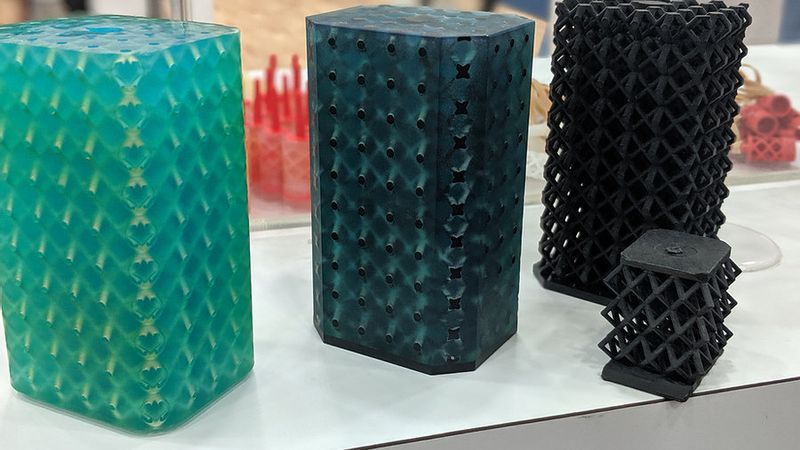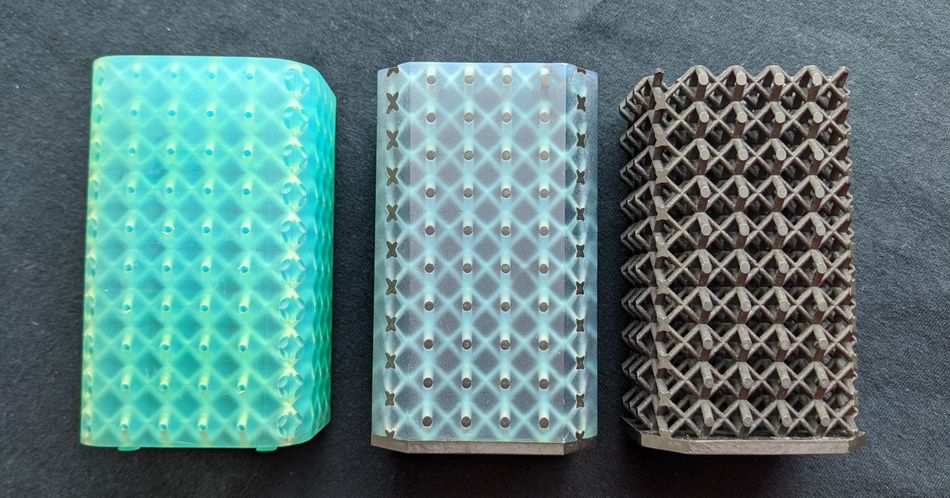Collaborative manufacturing process delivers rapid materially accurate prototypes
The combination of 3D printing and injection molding creates a start-up friendly approach to fast, low-risk prototyping.

Photo courtesy of Sarah Goehrke, Fabbaloo.
Testing and prototyping is a crucial part of the design process. For products manufactured using injection molding, the prototyping phase has its own set of challenges. Due to the high cost of creating molds, prototypes are often produced in another material, the design and form and iterated, before the final high-cost molds are crafted. Even if cost wasn’t an issue, getting an injection molded prototype can take months from initial idea to holding a prodcuct in your hand. This extremely long lead time stalls the design process and delays time to market.
Mitsubishi Chemical Advanced Materials has developed a prototyping and manufacturing process that allows functional, material-accurate prototypes to be produced quickly at a considerable reduction in traditional injection molding manufacturing costs. The process involves two overlapping chapters. The first is engineering support that elevates the existing design through an intensive design evaluation and improvement process. The second is the prototyping stage at which the design is further iterated through real-world testing.
Chapter 1: Engineering Support
Stage one: Assessing technical and commercial viability
The first step is the conceptual design phase. This involves close collaboration with the product designers to identify the technologies that are best suited to the part or product that will allow them to deliver a commercially viable product. Once a clear definition and a thorough understanding of the application are understood, the product moves into stage two.
Stage Two: Collaborative design engineering
Stage two centers around collaborative design engineering. Many KyronMAX® users are exploring opportunities to shift from existing metal design to a carbon fiber based composite solution. Making this move can be beneficial for many reasons, including lightweighting, particularly in transportation applications or moving parts (like robotic arms and grippers), reducing carbon footprint, and reducing manufacturing costs. To successfully exchange metal for a compound material, the design must be comprehensively evaluated to take optimal advantage of the new material’s properties. Mitsubishi Chemical Advanced Materials engineers bring extensive expertise in the polymers and composite space. They can offer valuable insight for customers into materials and modeling simulation to really improve their design and meet the desired cost and produce ability targets.
Chapter two: Prototyping and batch part testing
Stage Three: Rapid Prototyping
This stage sees the customer’s designs come to life. The Mitsubishi Chemical Advanced Materials SPRINT (Soluble Printed Injection Tooling) technology uses 3D printed molds that are later rinsed off the injection molded part using a solvent. The technology is based on AddiFab’s Freeform Injection Molding (FIM). The SPRINT process encourages designers to test designs quickly and accurately, which speeds up the development process and can help bring products to market faster. The SPRINT process works specifically in conjunction with the KyronMAX® range of high strength carbon fiber-based composites.
SPRINT accelerates the design cycle by reducing the number of iterations in the design process. Many of the common prototyping processes that are available today provide engineers with quick access and some insight into the basic form and fit aspects of their design, but the SPRINT process provides customers with prototypes from the technologies that the final product will be produced from. Because the prototypes are produced using real injection molding its performance is representative of the final application so this means that the prototype parts can be fully functionally tested in the application’s environment.
This is a critical step in really linking the design with performance and getting products to market faster. Mitsubishi Chemical Advanced Materials aim to build relations with each of its customers and offer a full suite of the capabilities needed to provide the right material solution, the engineering know-how and analytics, and the prototyping services that are necessary to translate these concepts into real solutions. The SPRINT process opens the doors to designers and creators who would otherwise be unlikely to have the ability to use injection molding as a prototype material.
The expertise of the team also means customers in the final phase of their product can get assistance in commercialization. Where relevant, Mitsubishi Chemical Advanced Materials can fulfill actual part production as a certified supplier and manufacturing partner. Mitsubishi Chemical Advanced Materials also has expertise located regionally in the U.S, Europe, and Asia so customers can get immediate and global access to the knowledge and support they need along their development journey.
The SPRINT technology in detail
Once the part’s design is ready, it’s time to start prototyping using the SPRINT (Soluble Printed Injection Tooling) technology, based on AddiFab’s Freeform Injection Molding (FIM).

Step 1: 3D Print the mold
The mold for the part is built as a 3D model and printed using a 3D printer. This mold has can have steel pins inserted into it to stabilize the mold during the injection. The mold is also placed inside a metal frame for further stabilization. Even metal inserts, like screw threads can be included directly and overmolded.
Step 2: Inject the mold
The mold is injected with the selected KyronMAX® material using standard injection molding machinery. The injected mold is removed from the machine and inspected.
Step 3: Retrieve the part
The 3D mold is then washed off the molded part using a solvent. Once the solvent is removed, the part is inspected and ready for testing!
This process can be repeated multiple times to iterate a design. In some cases, multiple cavities are injected at once with different designs to shorten the design cycle even further. As the cost and speed of printing the mold are very low, the benefits of engaging in a more hands-on design iteration process are very high. As the prototype is molded in the exact material of the final product the prototyping process allows for iteration in finish and detail of the product as well as functionality.

The KyronMAX® Challenge
The KyronMAX® Challenge invites you to submit a design that utilizes KyronMAX®’s range of breakthrough, high strength carbon fiber-based composites. The winning designs will receive $25,000 worth of manufacturing support from KyronMAX® to create a fully developed prototype.
Your submission can be a stand-alone product or a component of a larger design. Successful submissions will need to show how the design utilizes the unique properties of KyronMAX® materials and complements the platform’s capabilities. The KyronMAX® challenge will reward projects that prioritize sustainability while maintaining a high level of feasibility and ingenuity.
For full challenge details see The KyronMAX® Challenge homepage.
About the sponsor: Mitsubishi Chemical Advanced Materials
Mitsubishi Chemical Advanced Materials is a leading global manufacturer of high-performance materials in the form of semi-finished products and finished parts. The company has locations in 20 countries and more than 2,800 employees. Its specialty engineering thermoplastics and composites are superior in performance to metals and other materials and are used in a wide range of applications, primarily in the capital goods industry. The company is continuously developing new areas of applications in close cooperation with industry leaders in a broad variety of customer markets. The Mitsubishi Chemical Advanced Materials Group is well prepared to further expand its market leadership position.
Supporting the vision of our holding company, Mitsubishi Chemical Holdings Corporation (MCHC), Mitsubishi Chemical Advanced Materials is committed to the realization of KAITEKI, “a sustainable condition which is comfortable for people, society and the Earth”. To realize this vision, the MCHC Group engages in corporate activities that provide products, technologies and services based on the comprehensive capabilities of the Group in the Performance Products Domain, Industrial Materials Domain and Health Care Domain, with chemistry as the basis of our activities. We jointly express and promote our commitment under the corporate brand THE KAITEKI COMPANY.

